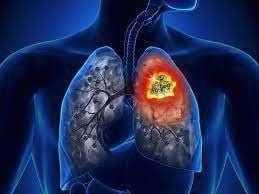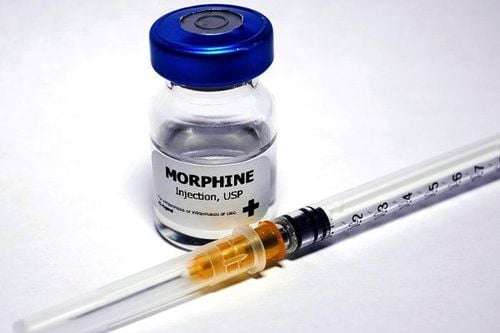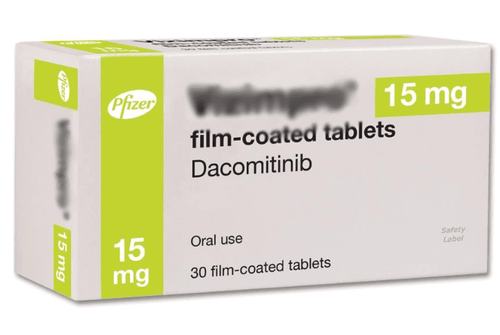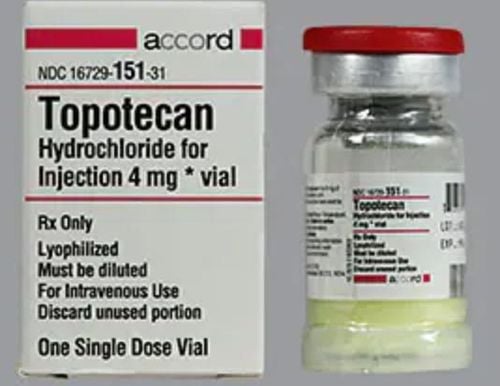This is an automatically translated article.
Post by Master, Doctor Mai Vien Phuong - Gastrointestinal Endoscopy - Department of Medical Examination & Internal Medicine - Vinmec Central Park International General Hospital.Lung cancer starts with lung cells that have changed, multiplied, and then grouped to form a tumor. This cancer can spread throughout your body but is still called lung cancer because of the origin of the mutated cells in the first place.
1. Learn about lung cancer
There are 2 types of lung cancer. These are non-small cell lung cancer and small cell lung cancer.
Most lung cancers are called non-small cell lung cancer (NSCLC). This group includes:
adenocarcinoma Squamous cell carcinoma Large cell carcinoma ALK-positive lung cancer The second smaller type is called small cell lung cancer (SCLC) and also sometimes called oat cell cancer.
Cancer in your body can affect the white blood cells (white blood cells) of the immune system. White blood cells are made in the bone marrow and found in blood and lymph fluid. There are a number of different white blood cells, all of which work together to protect you from disease and infection.
A normal white blood cell count is between 3,700 and 10,500 per microliter of blood. A number that is too high or too low indicates that you may have a condition that requires medical help. Lung cancer is one such condition, because your white blood cell count may be out of range when diagnosed.
Trắc nghiệm: Hiểu về phổi của bạn
Phổi là một tạng lớn rất quan trọng và không thể thiếu trong cơ thể. Việc giữ cho lá phổi của bạn luôn khỏe mạnh, tránh khỏi những bệnh phổ biến về phổi là điều bạn cần lưu ý để giúp cơ thể bạn có thể vận hành tốt. Hãy cùng chúng tôi trả lời nhanh những câu hỏi trắc nghiệm sau sẽ giúp bạn hiểu về phổi của bạn hơn.
Bài dịch từ: webmd.com
The following content is prepared under supervision of Thạc sĩ, Bác sĩ y khoa, Nguyễn Huy Nhật , Nội Hô hấp , Khoa Khám bệnh & Nội khoa - Bệnh viện Đa khoa Quốc tế Vinmec Đà Nẵng
2. Does cancer increase white blood cell count? Lung cancer can cause a high white blood cell count due to infections such as bronchitis or pneumonia that occur along with the cancer. The white blood cell count increases as the immune system fights these infections.
3. Can cancer cause a low white blood cell count? Chemotherapy used to treat cancer can interfere with the normal function of the bone marrow. This is where your white blood cell count is made. Chemotherapy affects the whole body, so it can reach the cells of the bone marrow, although the cancer it is treating may be in other places. other in the body. Damage to white blood cells can cause white blood cell counts to drop. Radiation therapy is limited to a specific site, but if the treatment area includes large marrow-producing bones, this can also may cause your white blood cell count to drop. A viral infection can also affect your white blood cell count. If an infection disrupts white cell production in your bone marrow, your white blood cell count will drop. Sometimes, cancer growth in the bone marrow can interfere with the normal production of white blood cells, reducing their numbers. If cancer cells from the lungs have spread to the bone marrow and then multiply, this is called metastasis. Bone metastases occur in 30-40% of lung cancer cases.

4. Does lung cancer show up in the blood? Lung cancer is not diagnosed by blood tests. Instead, the disease is detected through symptoms. Your doctor will make a final diagnosis after examining a sample of lung cells in the laboratory.
Information and procedures that doctors can use to diagnose lung cancer include:
Medical history Physical exam Imaging tests such as X-rays, CT scans, MRI scans, PET scans and scans bone Sputum cytology (analysis of lung mucus) Thoracoscopy (analysis of fluid around the lungs) Needle biopsy (analysis of cells removed from a mass) Bronchoscopy (insertion of a tube with inserting a camera into your nose or mouth, going down your windpipe and into your lungs) Thoracoscopy (inserting a tube equipped with a camera through a small incision between your ribs, into the space in your side chest outside of your lungs) Ultrasound Lung function tests Blood tests are still important for your doctor to assess your overall health and see if you're a good fit for certain treatments like surgery.
5. What is dangerous about white blood cell count? White blood cells are an important part of the immune system, helping you fight infection and are most effective when their numbers are within a certain range.
A white blood cell count that is too low means you are at risk of infection. Your doctor will monitor your white blood cell count during treatment to make sure it doesn't get too low.
Because white blood cell count is so important, if treatment causes it to drop too much, your doctor will temporarily stop treatment. When your white blood cell count returns to a safe level, cancer treatment can continue.
Tell your doctor immediately if you experience any of the following signs:
Chills Fever Sweating Eating nutritious food, getting plenty of rest, avoiding germs and injuries is the way to go. Best to increase white blood cell count.

Cancer cells grow because they can interfere with your immune system in the following ways:
They have surface proteins that turn off the immune system's response. They have a genetic property that helps hide from your immune system. They can change the surrounding healthy cells, so these cells interfere with the immune system. Immunotherapy helps overcome these problems. Types of immunotherapy include:
Immune checkpoint inhibitors: Your immune system has checkpoints to prevent it from overreacting and harming healthy cells. Immune checkpoint inhibitors block these checkpoints, so your immune system is more active and can fight cancer. T-cell transfer therapy: The active T cells that attack your tumor are removed, changed to make them more effective, grow in large bursts, and then return to your bloodstream. Monoclonal antibodies: These are immune system proteins made in a laboratory and used in your body to mark cancer cells so the immune system can find them. Therapeutic vaccines. These vaccines are made from your own tumor cells to help the immune system learn to attack those cells. 7. Conclusion A white blood cell count protects your body from infection. If you have too many or too few white blood cells, this can tell your doctor that you have a condition that requires treatment. Lung cancer is one such condition.
Lung cancer starts in the lungs but can spread to other parts of your body. It is diagnosed by cytological analysis in the laboratory.
Cancer treatments like chemotherapy and radiation can lower your white blood cell count, which can increase your risk of infection. Your doctor will monitor your blood count and adjust treatment as needed.
Immunotherapy is a cancer treatment that works by strengthening your immune system. Cancer grows because it can interfere with your immune system, so the goal of immunotherapy is to compensate for this problem and make your immune system stronger.
Lung cancer is very dangerous, so lung cancer screening is the most effective measure for you to timely detect and treat lung cancer, protect your health and life. Currently, Vinmec International General Hospital has a Lung Cancer Screening Package with many outstanding advantages such as:
A team of highly qualified and experienced doctors. Comprehensive professional cooperation with domestic and international hospitals: Singapore, Japan, USA, .. Comprehensive treatment and care, multi-specialty coordination towards individualizing each patient. Having a full range of specialized facilities to diagnose the disease and stage it before treatment: Endoscopy, CT scan, PET-CT scan, MRI, histopathological diagnosis, gene-cell testing, .. There are full range of main cancer treatment methods: surgery, radiation therapy, chemotherapy, stem cell transplant... When registering for the Lung Cancer Screening Package at Vinmec, customers will receive a specialist examination. respiratory tract, low-dose computed tomography lung tumor screening.
Please dial HOTLINE for more information or register for an appointment HERE. Download MyVinmec app to make appointments faster and to manage your bookings easily.
References:Immunotherapy for cancer treatment. (2019). cancer.gov/about-cancer/treatment/types/immunotherapy Low white blood cell count. (nd). go2foundation.org/treatments-and-side-effects/side-effect-management/low-white-blood-cell-count/ Lung cancer basics. (In 2021). lung.org/lung-health-diseases/lung-disease-lookup/lung-cancer/learn-about-lung-cancer/what-is-lung-cancer/lung-cancer-basics Roato I. (2014). Bone metastasis: When and how lung cancer interacts with bone. ncbi.nlm.nih.gov/pmc/articles/PMC4014787/ Lung cancer testing. (In 2020). cancer.org/cancer/lung-cancer/detection-diagnosis-staging/how-diagnosed.html















